#Women In Refrigerators
Explore tagged Tumblr posts
Text
Why Magneto’s Storyline in X-Men: Apocalypse is The Worst (it’s not just Cherik)
Ok I just need to vent because this has been chewing away at my brain for far too long.
Cherik is far from the only reason why Erik’s family plotline in X-Men: Apocalypse is some of the stupidest, sloppiest, and most character-ruining pieces of writing I’ve ever seen. Haters may say “oh you’re just upset because he married someone who wasn’t Charles.” But, like, aside from the fact that the original timeline already established that Erik’s top priority was always the fight for mutantkind and he had no interest in settling down - whether that had anything to do with his feelings for Charles or not - the problems with the Apocalypse writing go WAY beyond just him & Charles:
Erik would never abandon his cause at this point. By the end of DOFP, Erik has just been imprisoned for a full 10 years thanks to the JFK situation. Meaning he has spent a full decade being forcibly inactive in the fight for mutants. And he just learned that all of his fears about humans and mutants came to pass in the future to the level where a time-traveler had to be sent to change the past. And he was so set on averting that future that he tried to kill his friend and the sister of the man he loved, and then made a whole speech on international TV begging for the mutants of the world to fight alongside him. This is the POLAR OPPOSITE of a man who would feel like settling down and walking away from the fight within the next decade. The Sentinels being cancelled did NOT make mutant life easy overnight; Stryker was still up to no good, and there is no way that there weren’t others like him doing the same. Yes, Raven’s actions made a very positive difference, but I think we have enough brain cells to agree that this did not mean things for mutants immediately became sunshine and rainbows to the level where Erik - the most (understandably) paranoid character in the X-Men series - would even consider taking a break, let alone giving up the fight permanently. Knowing what he did about the possibilities of the future would’ve made the Erik we know double down on his commitment to his cause and follow up on his actions in Washington.
Erik wouldn’t risk starting a young family at this moment in his life. Erik was a Holocaust prisoner, his people were massacred, his mom was shot when he couldn’t move the coin, and then Charles was shot when Erik accidentally deflected a bullet into him, and then every member of his Brotherhood save Raven were captured and killed. Not only is this more than enough grief for one character to have, but the man wouldn’t dare risk having a new family of his own when everyone he’s ever loved has gotten hurt (largely because of him), and when he’s an international fugitive. That is no time to risk being selfish, and he would know. He would’ve been the first to realize that a potential spouse and child would also end up killed, and so he’d avoid that altogether. In fact, he wouldn’t even consider it, because, as mentioned, he wouldn’t leave his cause behind. You know, if he was actually in character.
Magda is a human. At this point, Erik hates humans. Again, he has just been imprisoned by humans for 10 years for trying to save a mutant, and he just learned that in the future, humans would’ve wiped out mutants, exactly as he feared. Everything that happened in DOFP would only further inflame his already-passionate hatred of humans. He is not in the mental state to even begin to consider Charles’ philosophy and give a human a chance at a relationship, let alone marry a human.
The family lives in Poland. The country where Auschwitz is. The country where Erik and his family and people was imprisoned, tortured, and executed. The country where Erik had to watch Shaw kill his mother. Basically the LAST country in the freaking WORLD that Erik would want to ever see again, let alone spend the rest of his life in. Erik is fluent in multiple languages - he is shown to easily converse in French and Spanish in First Class - and has been all over the world thanks to his Nazi hunting, so if he really needed to flee the U.S., there were a hundred other countries he could’ve gone to and blended into (Canada, France, Mexico, anywhere in South America, heck, he even could’ve discovered Genosha during this time). But in the original timeline, he didn’t leave the U.S. at all despite being a national fugitive after escaping his plastic prison, and he never did get caught again, so….
Erik’s first meeting with Magda is completely OOC for him. Erik mentions that he told Magda who he was the first night they met and he trusted her then. EXCUSE ME??? Erik Lehnsherr does not trust strangers. Erik Lehnsherr does not tell the complete truth about himself and his past to just anyone; look at how deeply Charles had to probe before Erik opened up to him. This stupid line was obviously shoehorned in just to make their relationship seem like perfect soulmates and thus ensure it is doubly tragic when she gets thrown in the fridge 5 minutes later (more on that in a sec). Obviously the intention is for the audience to go “aww, he instantly trusted her, she instantly accepted him, this is true love…” Give me a break. You’re really telling me that Magda met this stranger one night, found out he was none other than the international fugitive who apparently killed the U.S. president and just tried to kill another president on live TV, and went “oh, no problem, honey, let’s make a baby and live the cottagecore dream!” That’s some BS if I’ve ever heard it, and I’m convinced the writers subconsciously knew it; there’s a reason that is revealed in a throwaway line rather than shown onscreen, because then nobody would’ve bought it.
Fridging. Magda and Nina exist in the movie for one reason and one reason only: To get brutally killed and give Erik even more grief and trauma so that he’ll seek revenge on the entire world, aka do what the plot demands of him, aka have the same journey as he did in First Class (more on that in a sec). That’s all. Neither of them are any more than one-dimensional plot devices. They are not characters at all. Magda isn’t even named in the actual movie (he doesn’t even say her name when she dies) - it’s so obvious they didn’t even know what her name would be when they made the movie. This is textbook fridging, and one of the worst examples of it of all time. It’s all the worse considering that Erik never met Magda in the original pre-DOFP timeline, meaning Magda originally most likely lived a long happy life and died old in bed. But now, she gets fridged just because the writers didn’t know what more to do with Erik. It’s misogyny of the highest level.
A parenthood story for Erik was already set up. DOFP already hinted at Erik being a father, with Peter’s comment about his mom. So if the writers wanted to show Erik as a father, and to include Magda, they already had a solution that would seamlessly flow from the previous film - make Erik and Peter’s relationship one of the centerpieces of the story, and let Magda be Peter’s mom! (You know, like she is in the comics!)
It doesn’t contribute anything new to Erik’s character development. From a screenwriting POV, this is unforgivable. May I remind you that Erik’s entire storyline in First Class revolved around grief and trauma for the loss of his family and people, especially his mom, and seeking revenge for it. Giving him a wife and daughter just so they can get killed too adds absolutely NOTHING to his character development. It’s merely retreading everything that already happened in his arc: he loses his family and goes on a roaring rampage of revenge. Completely superfluous, right down to Charles insisting that there’s good in him beyond the pain. The redundancy becomes apparent even in the dialogue, where Charles literally says “I told you since I first met you there’s good in you too.” The script itself can’t help but point out that all of this has happened before and literally nothing new has been added to Erik’s character arc.
See? It’s not just because of Cherik. Erik’s story in X-Men: Apocalypse is an atrocity in basic screenwriting and character development, on every level. And I will always despise it.
(Please tell me I’m not the only one who feels this way…)
#xmcu#x men#x men apocalypse#anti xmen apocalypse#magneto#erik lehnsherr#magda gurzsky#nina gurzsky#mutants#fox xmen#magneto xmen#x men movies#x men films#x men prequels#x men days of future past#peter maximoff#quicksilver#cherik#charles xavier#professor x#xmen meta#xmen magneto#xmen apocalypse#x men meta#magda lehnsherr#fridging#women in refrigerators
209 notes
·
View notes
Text
Gonna write a GL-centric fic to post on AO3 just so I can tag it with “no beta we get fridged like women”
#we die like Martin Jordan is also under consideration#no beta we die like men#ao3#alex dewitt#women in refrigerators#green lantern#dc comics
28 notes
·
View notes
Text
So I was reading Daredevil (vol. 1, issue 364) and I noticed something interesting about the cover.

Obviously there's a lot of superhero girlfriends that get thrown off buildings. But I think the most famous is probably Gwen Stacy. So immediately I started thinking about that, and I noticed that Karen is wearing Gwen's death outfit—just in inverted colors (The Amazing Spider-man, vol. 1, issue 121).

I also think it's interesting, comparing these two images, to look at the titles. "The Night Gwen Stacy Died" is one of the most famous Spider-man titles of all time
So to call this DD issue "Taking Back the Night" is really interesting to me, calling back to "The Night" title of the Spider-man issue. This DD issue is from 1997, and obviously feminism had progressed further than it had in 1973, when Gwen Stacy died. And though there was still a long way to go, I think writers were (sometimes) doing a (slightly) better job at treating female characters like actual people, rather than props.
So to me, the title "Taking Back the Night" along with putting Karen in an inverted version of Gwen's outfit seems to be making a very clear statement to the reader. It's an argument against fridging female characters (though obviously, that term wasn't being used yet).
This is especially interesting in the context of Daredevil. Only 24 issues before this one (vol. 1, issue 340), Glorianna O'Breen was thrown off a roof and died, and it had barely any plot significance at all. It was, imo, an even worse fridging than Gwen Stacy, because Glorianna hadn't even been in Daredevil for literal years at that point. She was only there so that she could be killed off.

(it's also worth noting that Glorianna is also wearing the short skirt and trenchcoat ensemble here)
There's this really interesting idea being played with in late '90s Daredevil, especially in conversation with "The Night Gwen Stacy Died." The idea is that the Daredevil writers are "taking back the night"; that is, taking back the night Gwen Stacy died. It feels like they're trying to reverse this trope, or retire it (though obviously, the trope didn't stay retired for long). It feels especially significant within the larger context of Daredevil. I mean, he's lost so many girlfriends over the years that it's a running joke at this point.
So to have Karen Page in the same position as Glorianna O'Breen, and in the same position as Gwen Stacy, but with a different outcome, feels really progressive to me (at least for the time). There's a few factors here:
She puts up a fight. Obviously in the end, she's still saved by a man—but in the meantime she's not waiting around like a passive victim.
She's being targeted on her own merit. She's in danger because she's tangled up in some shady business at work; this fight has nothing to do with Daredevil. She isn't being used as a plot motivator for Matt.
The villain who throws Karen off the roof is a woman, not a man.
Karen survives, where the others have died.
Did the writers succeed in "taking back" what they did to Gwen Stacy and Glorianna O'Breen? I don't know. It was certainly an attempt, and it definitely reflects the attitudes of the time in which it was written. It certainly feels like a step forward.
But the fact remains, all of this is undercut by the fact that only 21 issues later, Karen is killed off anyway (Daredevil vol. 2, issue 5).

Anyway, all of this is just fascinating to me. I'm trying to get into more academic/critical comic studies lately, doing close readings and analyses of the texts, and the intersection of Daredevil and feminism is especially interesting to me. I have a different academic Daredevil paper I'm trying to put together for a conference next year, but maybe at some point I'll write more about the women of Daredevil as a reflection of women in comics more generally.
#daredevil#karen page#gwen stacy#glorianna o’breen#spider man#comics#feminism#women in refrigerators#media analysis
25 notes
·
View notes
Text
Something impressive about the Arkham Knight is the amount of women they manage to put into a fridge in a single video game. Like at that point, it's a performance. The better question is, who didn't they fridge? Nyssa, Harley, maybe that Jokerized lady doesn't fit the criteria though she does die.
Barbara? Severe case of fridging (+bonus point for dating Tim, who thought it would be a good idea honestly)
Selina? Who thought it would be a good idea to put a collar on Selina and put you in a mindset where having to save her all through the game becomes an annoyance and distraction?
Nora Fries the OG freezer victim (ik it wasn't actually her but damn if that isn't a fun pun). Liked that they took her out of the freezer and microwaved her though.
Talia isn't even here???! Fridging talia when she hasn't even appeared like i get she died last game but her being mentioned for the first time in the whole game when Joker needs ammo to torture Bruce is so wild
Poison Ivy walks through the whole game with her pussy out and a single spinach leaf over her boobs, gets fridged on first appearance and then dies, that's it that's her arc
Francine, Manbat's wife, appears just long enough to give us a reason to empathize with the guy and then brutally, immediately dies (thank you for pointing it out! ) also there's something Mileva Einstein-ish about her dedicating her life to research for her husband's disability, working with him as a partner, only to be mauled to death by him as a result of their own research. This is why we don't have enough famous women in STEM.
___________________________
Bonus:
Bruce: That can't be Harley's plan, she's not smart enough for that
Me: yeah well one of you got through medschool asshole, and it wasn't you
#arkhamverse#arkham knight#dc#batman#i don't even hate the game#like Jason's VA does enough powerlifting that I don't hate it#but goddam is the representation of women grating#women in refrigerators#feel free to tell me if I missed any!
21 notes
·
View notes
Text
Let me talk about Women in Refrigerators
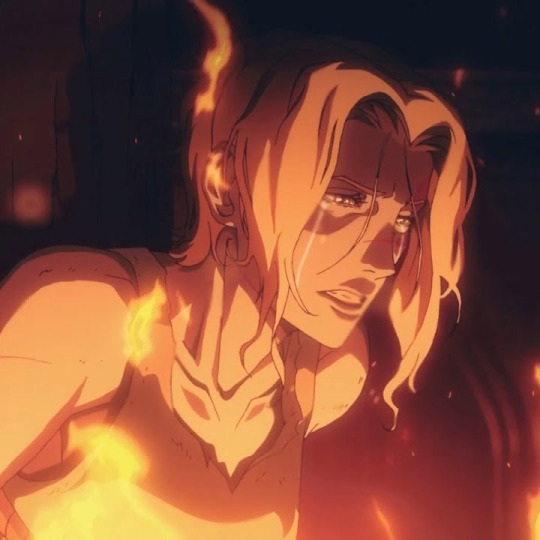
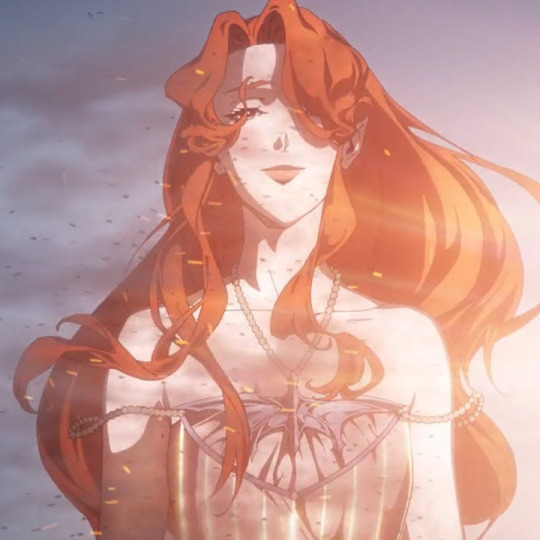
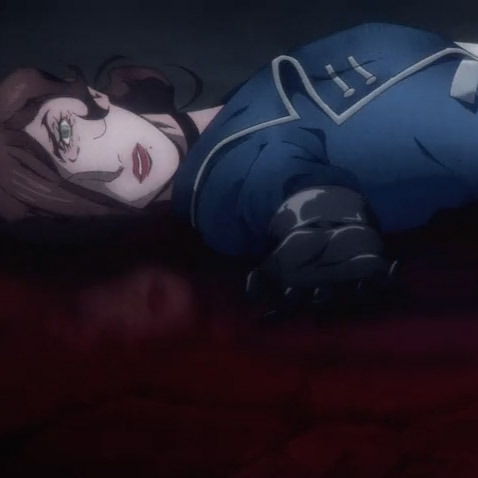
You know what? This is a thing that is kinda annoying me in the Castlevania fandom. How everyone is screaming about Women in Refrigerators, while folks so clearly do not understand what the trope actually is about and why it is a bad trope.
Like, there is not a single death of a named woman in Castlevania, that not at least someone has called "fridged". Alright, maybe Drolta. But other than that... yeah, folks definitely have called Lenore and Carmilla fridged. And... No, people, you misunderstand the trope.
The name of the trope was coined based on Green Lantern vol. 3 #54 (from the 90s), in which Green Lantern finds his death girlfriend stuffed in a refrigerator - mostly for shock value in the reader. Mind you, this was the 90s, when superhero comics were really, really edgy and stuff. And in fact the kind of story happened a lot of times during this time. Female characters being killed, raped and tortured for pure shock value, with the story not featuring any idea of what this did to the female character, but rather focusing on what this does to the male characters. (And mind you: Yes, a woman can be considered fridged and still survive the ordeal. A lot of folks do consider Barbara in The Killing Joke fridged as well.)
So, what does "Fridging" in terms of the trope mean? Basically it means that a female character suffers a horrible fate just so that another (most probably male) character can be motivated to do something and react to this thing happening, setting in motion a character arc for the surviving character - or even setting into motion the plot.
In many examples it should also be noticed that at times the female characters mostly just exist to meet their horrible end. Supernatural as a show is really bad in this regard. Like, within the first episode of the show THREE FUCKING WOMEN get fridged, just so that the brothers can travel together and start the plot.
So, let's move back to Castlevania.
Lisa is fridged. There is no way around it. Yes, it does not feel like it, because they still managed to make her a character of sorts, but yeah, she definitely is fridged. She dies a horrible death and that death is what motivates the plot, as well as what motivates both Alucard and Dracula. That is very classical fridging no way around it.
Carmilla and Lenore, though? Yeah, they are not fridged. They are characters who just die. Their death is not used to motivate another character. Their death is also not random, like most fridging deaths. Especially Carmilla is basically asking for her death, of course. She is a villain and gets the same death as all other villains. And while it is a bit different with Lenore, she definitely is not fridged either, giving that she literally dies in the last episode with no plot or development happening because of her death.
In Nocturne it gets a bit more complicated. Is Julia fridged? In a way, I would argue, she is, mostly on the value that she exists as a character to die and for her death to be the basis for Richter's character arc, giving him the trauma he needs to overcome.
Esther meanwhile does not feel fridged to me. Because Annette's trauma is not deeply linked to her death, rather than the entire slavery experience in general.
Tera? Well, for Tera it is too early to tell. I still assume that her change into a vampire is going to be used to have the characters realize, that vampires are not inherently evil, and to give us a view into what vampire society looks like. At least that is what I assume.
By the way: The fridging of female characters is my big issue with the PS2 Castlevania games. Like, in Lament of Innocence both Sara and Elisabetha are getting fridged to motivate Leon and Mathias. And the same is true for Rosalie in Curse of Darkness, who as a character only exists to motivate Hector. I mean, she is so replacable as a character, that Hector fucking replaces her by the end of the game.
#castlevania#castlevania netflix#castlevania nocturne#refrigerated women#women in refrigerators#fridging#feminism#women in media#julia belmont#castlevania lisa#castlevania tera
123 notes
·
View notes
Text
I'm suddently understanding Gail Simone on a different level right now
I liked Alex and i knew she was going to die i can't imagine how i'd have reacted if i hadn't know

I'm mad af she only got 5 issues
However on a very different note : this is kinda funny i will send it to people :


7 notes
·
View notes
Text
8 notes
·
View notes
Text
@airebeam New rule no more edge lord writers. Only wholesome writers with legit passion for good superhero stories.
youtube
#spiderman#mary jane watson#one more day#green lantern#hal jordan#kyle rayner#women in refrigerators#dr. light#edge lord writers#Youtube
20 notes
·
View notes
Text
The ACTUAL heck?! Not Kamala! Please don't permanently kill off Kamala Khan Marvel!
Wait... WWWHHHAAATTT???!!! This can't be for real! This honestly cannot be real! Apparently there was a leak for the upcoming issue of Amazing Spider-Man (2022) #26 by Zeb Wells & John Romita Jr. in which they apparently kill off Ms. Marvel (Kamala Khan)?!
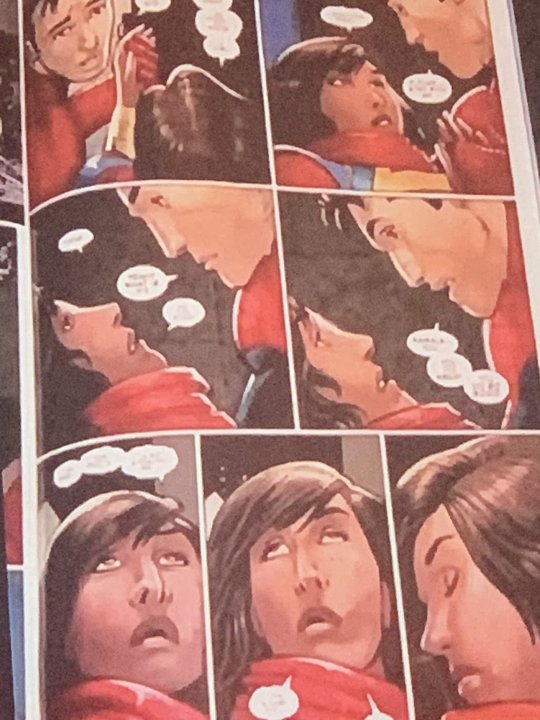
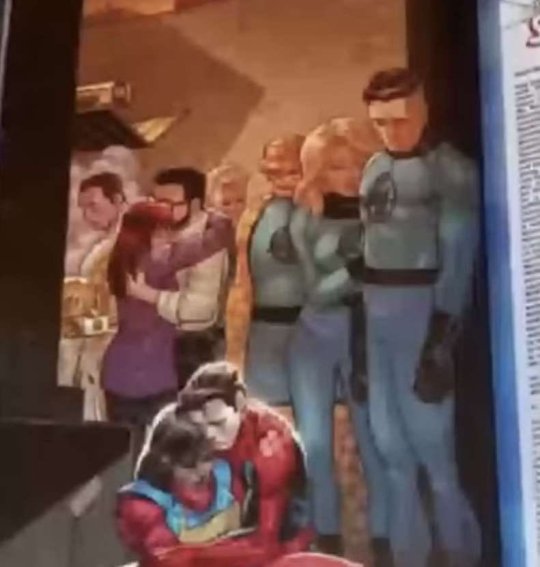
This has honestly got to be some kind of fake-out or misdirection. It would be absolutely stupid and insulting for Marvel to kill off not only their most prominent South Asian Muslim female super hero in a white male superhero's book (which not only feeds into the misogynistic "women in refrigerators" trope, but is also rather racist and Islamophobic...), but one of the most popular and successful characters Marvel has created in recent memory! Plus, Kamala did actually die already once in the pages of Champions (2019) #2, but she was immediately resurrected in the exact same issue through a deal Miles Morales made with Mephisto (though sadly someone else died in Kamala's place because making a deal with the Devil is the equivalent of making a wish on the Monkey's Paw)!
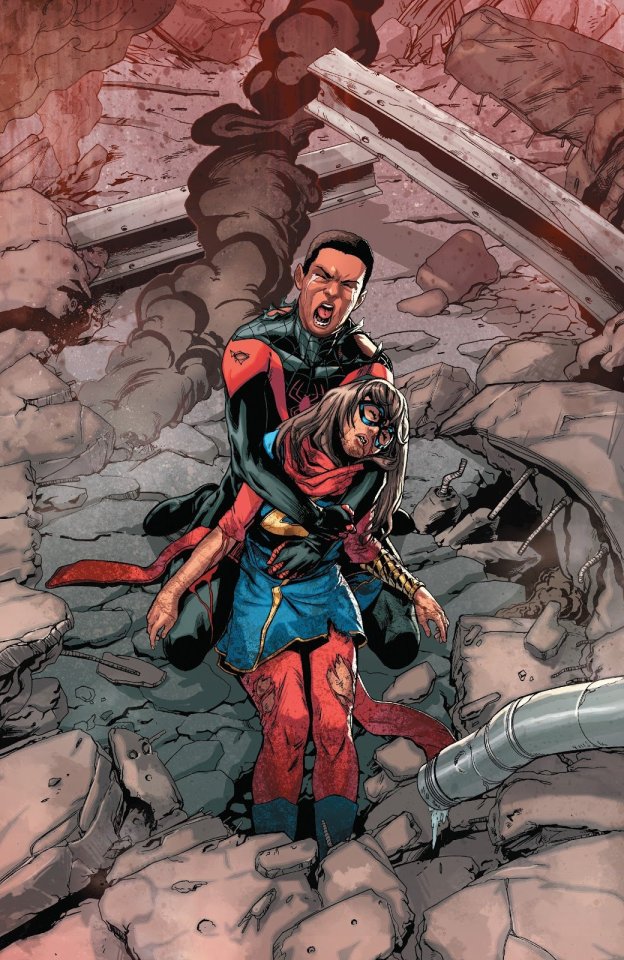
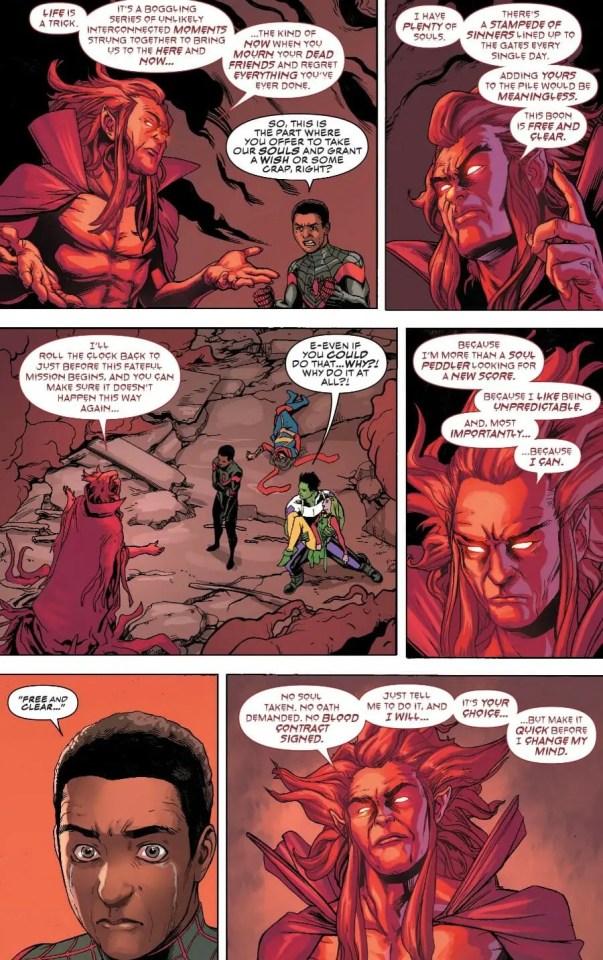
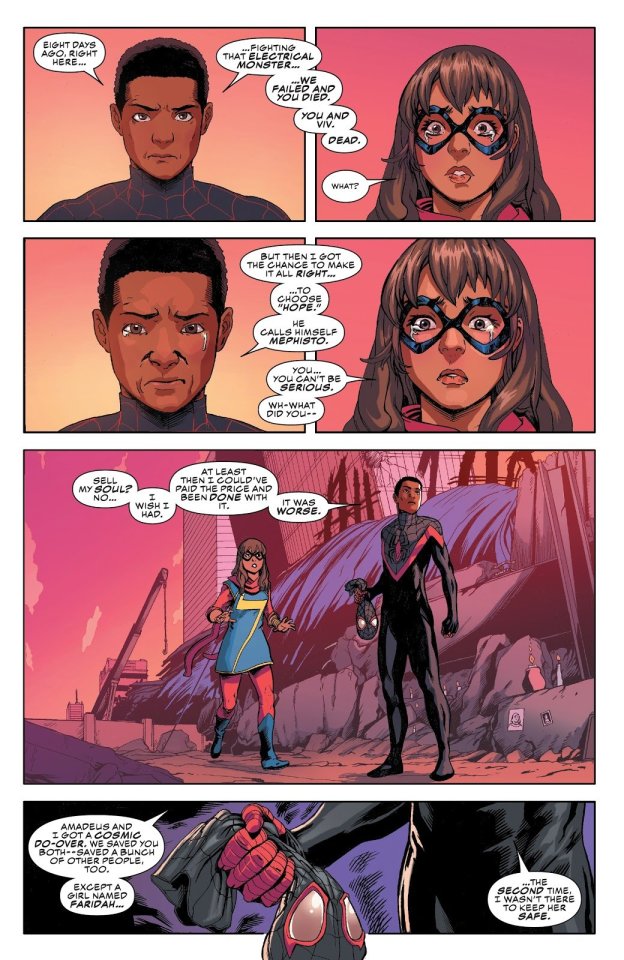
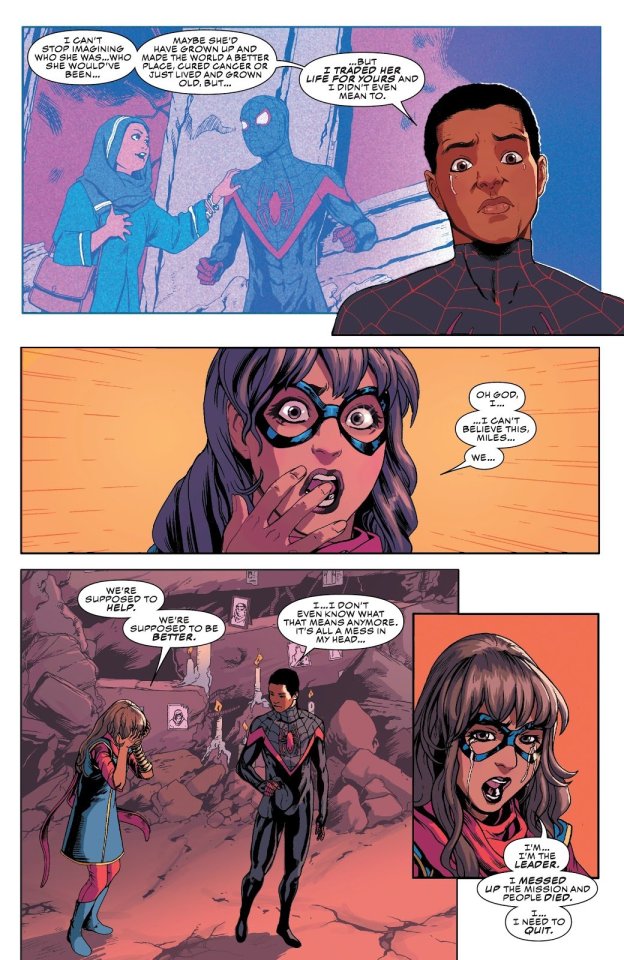
So what exactly would motivate Marvel to do this?! Given how popular and successful Kamala's character has been both in and outside of comics, permanently killing her off in a completely separate character's series seems like an incredibly bad business decision that will only serve piss fans off!
Overall, I'm desperately hoping that this alleged death for Kamala is either a complete fake-out or just temporary on the Spider-Man author's part. But I'm still really nervous considering that Marvel is also going to be releasing a one-shot issue titled, Fallen Friend: The Death of Ms. Marvel (with some of her original writers like Saladin Ahmed & Mark Waid attached to it)...

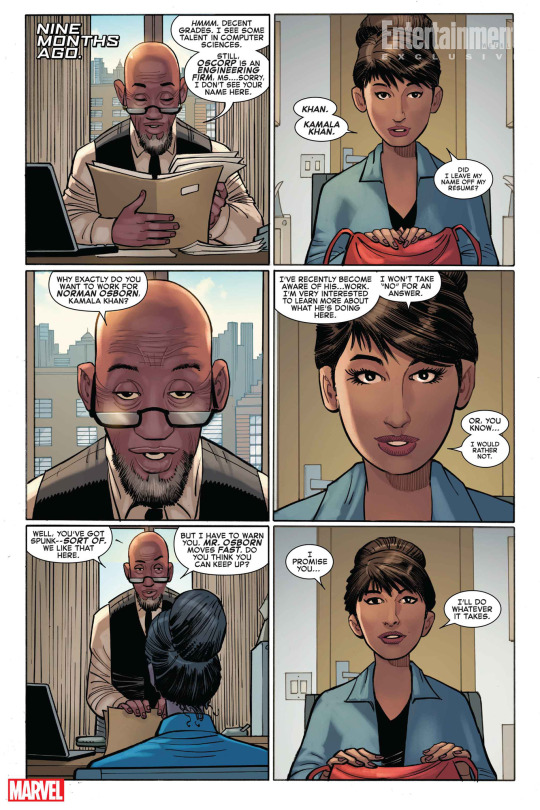

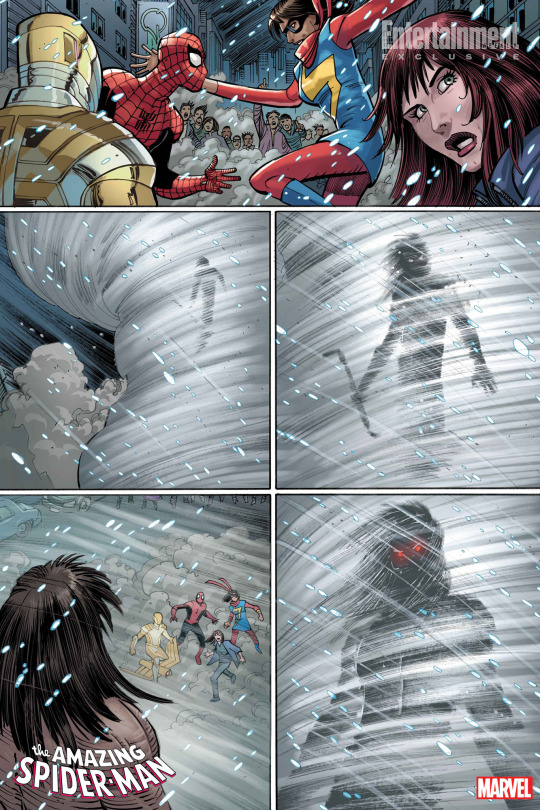
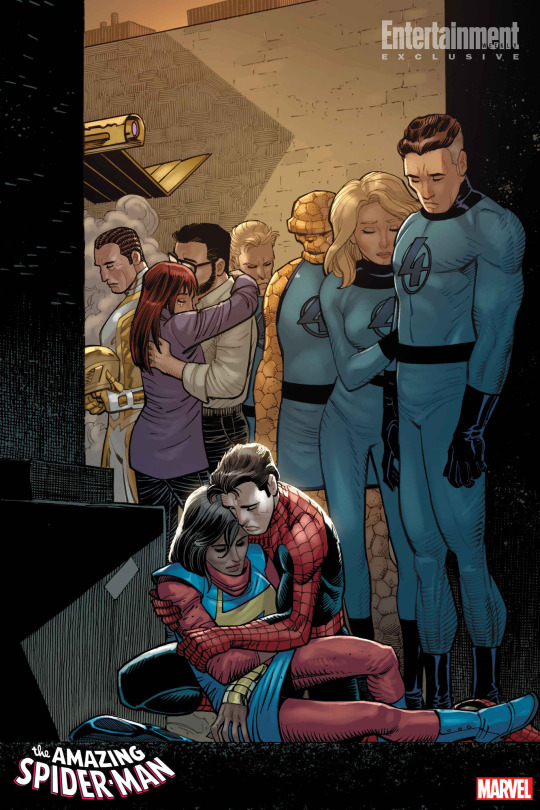
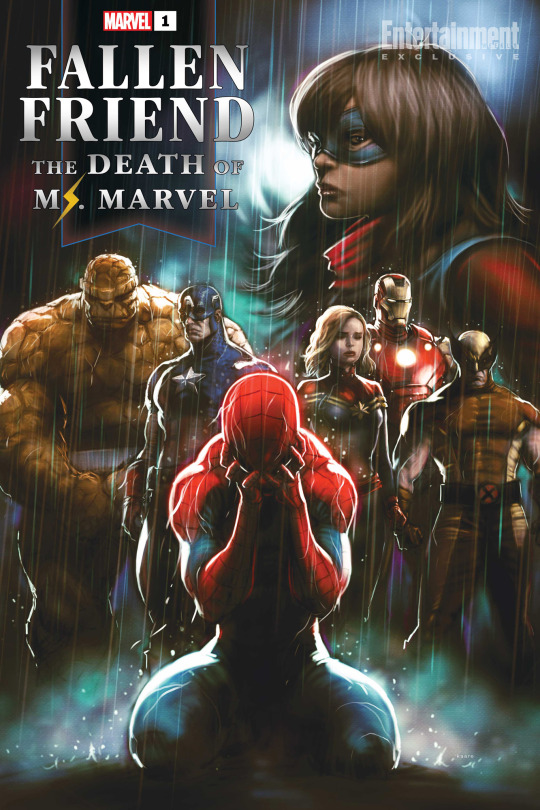
Just... why is this happening?!
But as deeply disappointed and frustrated as I am by this leak and news, I strongly condemn any person who tries to harass or send death threats to Zeb Wells or any other of the creators involved with this terrible decision!
In the immortal words of Linkara, we can criticize a bad story without becoming supervillains ourselves. Harassment and death threats are NEVER acceptable under any circumstances, no matter how bad you think a story is!
youtube
#ms marvel#kamala khan#spider man#peter parker#women in refrigerators#comic spoilers#just... wwwhhhyyy???!!!#amazing spider man#ms marvel comics#zeb wells#john romita jr.#marvel comics#marvel champions#miles morales#mephisto#jim zub#tangent#linkara#Youtube
162 notes
·
View notes
Text
Nina’s locket with Erik’s parents’ photos in it is such a forced plot device. Like, you’d think we would’ve seen an heirloom as important as that in First Class! Erik would’ve either been wearing it, or at least looking at it at some point. And like how did he manage to save it, considering he lost everything in the camps and was at Shaw’s mercy for so long? Surely Shaw would’ve taken it from him. Even if Shaw didn’t take it, everything was taken from Erik again when he was arrested for JFK, and we don’t see him taking it back in Days of Future Past along with his helmet. It comes out of nowhere in Apocalypse and was so obviously written in just to make his killing of the cops extra emotional after the big fridging. We never even see it again after that. It’s so stupid.
#xmcu#x men#x men movies#x men films#x men prequels#x men fandom#x men magneto#x men first class#x men days of future past#x men apocalypse#anti xmen apocalypse#erik lehnsherr#nina gurzsky#magneto#nina lehnsherr#sebastian shaw#erik lensherr#xmen erik#xmen magneto#fox xmen#mutants#magneto xmen#cherik#dadneto#fridging#women in refrigerators#magneto x men#magnet family#magda gurzsky#magda lehnsherr
68 notes
·
View notes
Text

Kyle sobbing over his dead girlfriend's fridge emote
This post is brought to you by the fridge gang
Free to use, not for commercial use
#discord emoji#discord emote#free to use#face emote#dc comics#dc green lantern#green lantern#kyle rayner#fridging#women in refrigerators
21 notes
·
View notes
Text
Okay, but everyone keeps saying "Poor Honzo", "He can't catch a break" and I'm sitting over here like "Poor Harumi". Because she gets killed mercilessly in every damn thing she's in. She could just be sitting there, existing, and the writers just go "Not today bitch". Who the hell did she piss off so much that they want her dead in every excruciating way possible. In Scorpion's invasion cutscene, they literally made the most cruel and sadistic ways to kill her. Like, when will it end?
#justice for harumi#oh and satoshi too if there's time#make her an official playable charater you cowards!#mortal kombat#harumi hasashi#satoshi hasashi#mk#mk1#scorpion#scorpion x harumi#honzo x harumi#women in refrigerators
77 notes
·
View notes
Text
Listen: Bigender Bisexual Schroedinger Kyle Rayner who is trapped into a fridge that might or may not be broken enough to allow oxygen to get in and save her. His boyfriend and girlfriend have both made their trauma about his death into a turning point in their life and motivation to be a hero and stop this tragedy from happening to anyone ever again, but they're also perfectly fine and chilling because she's okay. He is simultaneously alive and dead. His girlfriend keeps his picture in a necklace around her neck to remind herself of the one person she couldn't protect. All three of them are grabbing coffee next thursday.
12 notes
·
View notes
Note
Do you think the term 'fridging' has become overused, and if Brienne does sacrifice herself for Jaime, would that not count?
I think that one of the useful things about the term fridging is that the website "Women in Refrigerators" is still up so we can know exactly what Gail Simone wrote when she coined the term back in the 90s. To quote her:
"Hi. This is a list I made when it occurred to me that it's not that healthy to be a female character in comics. I'm curious to find out if this list seems somewhat disproportionate, and if so, what it means, really. These are superheroines who have been either depowered, raped, or cut up and stuck in the refrigerator. I know I missed a bunch. Some have been revived, even improved -- although the question remains as to why they were thrown in the wood chipper in the first place. I know I missed a bunch -- I just don't know my comics deaths the way I should. I'm not editorializing -- I'm just curious to find out what you guys think it means, if anything. The preceding letter was written and sent by me when I realized one day that most of my favorite female comics characters had met untimely and often icky ends. The history of the idea and this site are listed here, and the responses from various comics professionals are listed here. An important point: This isn't about assessing blame about an individual story or the treatment of an individual character and it's certainly not about personal attacks on the creators who kindly shared their thoughts on this phenomenon. It's about the trend, its meaning and relevance, if any. Plus, it's just fun to talk about refrigerators with dead people in them. I don't know why.
In Simone's original meaning, "fridging" specifically applied to superhero comics, it involved a spectrum of violence from depowering to sexual assault to physical assault to mutiliation to murder, and it was disproportionately gendered. Notably, the qualification that "fridging" is done in order to motivate the (disproportionately male) protagonist rather than as part of a heroic character arc for the woman being fridged, came around a little later, mostly from those creators who were responding to Simone's initial provocation. However, you can see that this particular qualification was an idea floating in the aether at the time Simone was writing her first foray.
Do I think the term has become overused? It's certainly spread to more genres outside of superheroes, but I don't think that's an over-extension, since we're usually talking about the same phenomenon happening in "heroic" subgenres of fantasy, sci-fi, romance, etc.
Does this apply to Brienne sacrificing herself to save Jaime?
No.
Brienne's self-sacrifice is the logical and emotional climax of her own character arc, one rooted in chivalric romance in which Brienne seeks to play the role of the tragic knight. She is introduced as an existential true knight, someone who finds life in Westerosi society a constant trial and humiliation but who longs to escape into a world of song and story through glorious deeds:
"Because it will not last," Catelyn answered, sadly. "Because they are the knights of summer, and winter is coming." "Lady Catelyn, you are wrong." Brienne regarded her with eyes as blue as her armor. "Winter will never come for the likes of us. Should we die in battle, they will surely sing of us, and it's always summer in the songs. In the songs all knights are gallant, all maids are beautiful, and the sun is always shining."
As in real-world chivalric romance, the structures of Westerosi chivalric romance are built around tragedy: the Dragonknight doesn't get to settle down with Naerys, but gives up his life to save King Aegon IV, and it's the doomed chaste romannce and the stubborn attachment to duty that makes it all so damn chivalrous.
Thus, from Brienne's introduction to now, we see Brienne looking for someone worthy to sacrifice her life to save:
she starts with Renly, except that she can't save him from the magic (although that does mean that she doesn't learn how unworthy he was) and becomes blamed for his death instead.
then she shifts to Catelyn, except that she can't save her because Catelyn sends her away so she's not there during the Red Wedding.
Jaime and Brienne's ASOS trek across the Riverlands, from the revelations of his backstory to him jumping into the bear pit to his quest-giving at the end, is entirely about setting him up as the third of three lord/lady-coded characters that Brienne could sacrifice herself for. And lo and behold, we have a situation where Jaime and Brienne are about to come face-to-face with Lady Stoneheart, a scenario we've already seen be grounded in questions of sacrifice and honor.
So unless GRRM somehow fucks up and makes the conclusion of Brienne's arc more about Jaime than Brienne, it's not a case of fridging.
57 notes
·
View notes
Text
I just realized that the writers of Hannibal literally fridged Beverley Katz.
I’m not sure what to do with that.
#justice for beverley katz#why does this show kill all my favourite female characters?#and also bella crawford#they killed her too#hannibal#nbc hannibal#women in refrigerators#beverley katz#abigail hobbs
9 notes
·
View notes
Text

SUPACELL (2024– ): Interesting but uneven Black British superhero drama, created by Rapman, about five seemingly unrelated South Londoners — delivery driver Michael (Tosin Cole), nurse Sabrina (Nadine Mills), ex-con Andre (Eric Kofi Abrefa), pot dealer Rodney (Calvin Demba), and gang leader Tazer (Josh Tedeku) — who discover that they have superhuman powers. Michael sets out to find the others after getting a glimpse of the near future in which he learns that his fiancée Dionne (Adelayo Adedayo) will soon be killed. However, Andre is more concerned with reconnecting with his teenage son (Ky-Mani Carty) and finding a job, Sabrina is desperately trying to keep hers while also trying to keep her sister Sharleen (Rayxia Ojo) out of trouble, Rodney is using his super-speed powers to run London's fastest weed delivery service, and Tazer is enmeshed in an escalating gang war against his former mentor Krazy (Ghetts).
The cast is great (Abrefa, Tedeku, Ghetts, and Ojo are especially good), the characters are engaging, the dialogue and setting are convincing, and there are some clever touches (including the eventual explanation of the title in Ep. 6). However, while watching the ways the characters' emerging powers impact their lives is engrossing, the actual superhero plot (which has distinct echoes of the late and unlamented HEROES) feels a bit stale, the characters' powers are not always clearly delineated, the big fight scenes are sometimes blah, and there are some hokey touches (like over-use of the glowing eyes effect seen on the poster image above).
More concerningly, SUPACELL's attitude toward and treatment of Black women is frequently troubling. The very talented Adedayo is wasted — I hated the way the narrative treated Dionne, which at points had me tempted to nope out — and most of the show's Black female characters consistently get very rough treatment with noticeably less sympathy than the men, which cast a gloomy pall over an otherwise compelling series.
CONTAINS LESBIANS? Not that I noticed, and given the show's attitude toward women, I fear any wlw would meet bad ends in short order. VERDICT: Given how relentlessly most nerd media marginalizes and mistreats Black characters and cast, it's great to see Black characters centered in a story like this, but while much of SUPACELL is really quite good, the misogyny left a bad taste.
#hateration holleration#teevee#supacell#rapman#tosin cole#nadine mills#eric kofi abrefa#calvin demba#josh tedeku#ghetts#rayxia ojo#misogynoir#adelayo adedayo#women in refrigerators#i also don't know what i think about the fact that sabrina and shar's episode shamelessly lifted the premise of#thelma and louise
10 notes
·
View notes